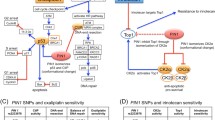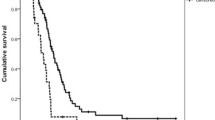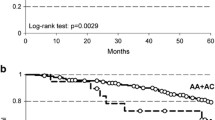Abstract
Background
Previous studies have suggested that DNA repair enzyme polymorphisms may bear prognostic value in metastatic colorectal carcinoma (MCRC).
Methods
We prospectively treated 43 MCRC patients with irinotecan-based regimens (XELIRI or IFL). Allelic variants of the XRCC1 gene at codon 399 and XPD gene at codon 751 were analyzed in lymphocyte DNA by PCR–RFLP. Clinical outcome variables: overall survival (OAS), progression-free survival (PFS) and the occurrence of grade 3 or 4 hematological and gastrointestinal (GIS) toxicities were evaluated.
Results
In the univariate analysis for OAS (n = 43) only XPD and XRCC1 polymorphisms were significant (P = 0.05 and P = 0.04, respectively). After adjustment for performance status (ECOG = 0, 1 vs. 2) and disease extent (single vs. multiple metastatic site), XRCC1 genotype and performance status retained significance (HR = 2.85, P = 0.04, and HR = 3.19, P = 0.02, respectively). Gln/Gln genotype was associated with the greatest risk of death. Type of presentation (metastatic vs. local disease at first presentation) was the only significant predictor of PFS in the univariate analysis (n = 40, P = 0.003). After adjustment for performance status and disease extent, type of presentation retained its significance (HR = 4.35, P = 0.003). None of the toxicities was associated with these genotypes.
Conclusions
XRCC1 genotype independently predicted overall survival in metastatic colorectal carcinoma patients treated with irinotecan-based chemotherapy.


Similar content being viewed by others
References
Ando Y, Saka H, Ando M et al (2000) Polymorphisms of UDP glucuronosyltransferase gene and irinotecan toxicity: a pharmacogenetic analysis. Cancer Res 60:6921–6926
Balin-Gauthier D, Delord J-P, Pillaire M-J et al (2008) Cetuximab potentiates oxaliplatin cytotoxic effect through a defect in NER and DNA replication initiation. Br J Cancer 98:120–128
Braun MS, Richman SD, Quirke P et al (2008) Predictive biomarkers of chemotherapy efficacy in colorectal cancer: results from UK MRC FOCUS Trial. J Clin Oncol 26:2690–2698
Carlini LE, Meropol NJ, Bever J et al (2005) UGT1A7 and UGT1A9 polymorphisms predict response and toxicity in colorectal cancer patients treated with capecitabine/irinotecan. Clin Cancer Res 11:1226–1236
El-Khamisy SF, Masutani M, Suzuki H, Caldecott KW (2003) A requirement for PARP-1 for the assembly or stability of XRCC1 nuclear foci at sites of oxidative DNA damage. Nucleic Acids Res 31:5526–5533
Ferlay J, Bray F, Pisani P, Parkin DM (2004) GLOBOCAN 2002: cancer incidence, mortality and prevalence worldwide. IARC Cancer Base no. 5, version 2.0. IARC Press, Lyon
Gurubhagavatula S, Liu G, Park S et al (2004) XPD and XRCC1 genetic polymorphisms are prognostic factors in advanced non-small-cell lung cancer patients treated with platinum chemotherapy. J Clin Oncol 22:2594–2601
Hansen RD, Sorensen M, Tjønneland A et al (2007) XPA A23G, XPC Lys939Gln, XPD Lys751Gln and XPD Asp312Asn polymorphisms, interactions with smoking, alcohol and dietary factors, and risk of colorectal cancer. Mutat Res 619(1–2):68–80
Horton JK, Watson M, Stefanick DF, Shaughnessy DT, Taylor JA, Wilson SH (2008) XRCC1 and DNA polymerase beta in cellular protection against cytotoxic DNA single-strand breaks. Cell Res 18(1):48–63
Hoskins JM, Marcuello E, Altes A et al (2008) Irinotecan pharmacogenetics: influence of pharmacodynamic genes. Clin Cancer Res 14(6):1788–1796
Iyer L, Ratain MJ (1998) Clinical pharmacology of camptothecins. Cancer Chemother Pharmacol 42(Suppl):S31–S43
Lenz HJ (2004) Pharmacogenomics and colorectal cancer. Ann Oncol 15(Suppl 4):iv173–iv177
Martinez-Balibrea E, Abad A, Aranda E et al (2008) Pharmacogenetic approach for capecitabine or 5-fluorouracil selection to be combined with oxaliplatin as first-line chemotherapy in advanced colorectal cancer. Eur J Cancer 44(9):1229–1237
Meyerhardt JA, Mayer RJ (2005) Systemic therapy for colorectal cancer. N Engl J Med 352:476–487
Monzo M, Moreno I, Navarro A et al (2007) Single nucleotide polymorphisms in nucleotide excision repair genes XPA, XPD, XPG and ERCC1 in advanced colorectal cancer patients treated with first line oxaliplatin/fluoropyrimidine. Oncology 72(5–6):364–370
Park DJ, Stoehlmacher J, Zhang W, Tsao-Wei DD, Groshen S, Lenz HJ (2001) A xeroderma pigmentosum group D gene polymorphism predicts clinical outcome to platinum-based chemotherapy in patients with advanced colorectal cancer. Cancer Res 61(24):8654–8658
Park SY, Lam W, Cheng YC (2002) X-ray repair cross-complementing gene I protein plays an important role in camptothecin resistance. Cancer Res 62(2):459–465
Quinney SK, Sanghani SP, Davis WI et al (2005) Hydrolysis of capecitabine to 5′-deoxy-5-5-fluorocytidine by human carboxylesterases and inhibition by loperamide. J Pharmacol Exp Ther 313(3):1011–1016
Rea DW, Nortier JWR, Ten Bokkel Huinink WW et al (2005) A phase I/II and pharmacokinetic study of irinotecan in combination with capecitabine as first-line therapy for advanced colorectal cancer. Ann Oncol 16(7):1123–1132
Ruzzo A, Graziano F, Loupakis F et al (2008) Pharmacogenetic profiling in patients with advanced colorectal cancer treated with first-line FOLFIRI chemotherapy. Pharmacogenomics J 8:278–288
Saltz LB, Cox JV, Blanke C et al (2000) Irinotecan plus fluorouracil and leucovorin for metastatic colorectal cancer. Irinotecan Study Group. N Engl J Med 343:905–914
Stelzner S, Hellmich G, Koch R, Ludwig K (2005) Factors predicting survival in stage for colorectal carcinoma patients after palliative treatment: a multivariate analysis. J Surg Oncol 89:211–217
Stoehlmacher J, Ghaderi V, Iobal S et al (2001) A polymorphism of the XRCC1 gene predicts for response to platinum based treatment in advanced colorectal cancer. Anticancer Res 21:3075–3079
Stoehlmacher J, Park DJ, Zhang W et al (2004) A multivariate analysis of genomic polymorphisms: prediction of clinical outcome to 5-FU/oxaliplatin combination chemotherapy in refractory colorectal cancer. Br J Cancer 91(2):344–354
Suh KW, Kim JH, Kim DY, Kim YB, Lee C, Choi S (2006) Which gene is a dominant predictor of response during FOLFOX chemotherapy for the treatment of metastatic colorectal cancer, the MTHFR or XRCC1 gene? Ann Surg Oncol 13:1379–1385
Sung P, Bailly V, Weber C, Thompson LH, Prakash L, Prakash L (1993) Human xeroderma pigmentosum group D gene encodes a DNA helicase. Nature (Lond) 365:852–855
Taylor RM, Thistlethwaite A, Caldecott KW (2002) Central role for the XRCC1 BRCT I domain in mammalian DNA single-strand break repair. Mol Cell Biol 22:2556–2563
Ünal M, Güven M, Batar B, Özaydın A, Sarici A, Devranoglu K (2007) Polymorphisms of DNA repair genes XPD and XRCC1 and risk of cataract development. Exp Eye Res 85:328–334
Vallböhmer D, Iqbal S, Yang DY et al (2006) Molecular determinants of irinotecan efficacy. Int J Cancer 119:2435–2442
Wu J, Yin MB, Hapke G, Toth K, Rustum YM (2002) Induction of biphasic DNA double strand breaks and activation of multiple repair protein complexes by DNA topoisomerase I drug 7-ethyl-10-hydroxy-camptothecin. Mol Pharmacol 61:742–748
Conflict of interest statement
There are no financial disclosures from any of the authors.
Author information
Authors and Affiliations
Corresponding author
Rights and permissions
About this article
Cite this article
Artac, M., Bozcuk, H., Pehlivan, S. et al. The value of XPD and XRCC1 genotype polymorphisms to predict clinical outcome in metastatic colorectal carcinoma patients with irinotecan-based regimens. J Cancer Res Clin Oncol 136, 803–809 (2010). https://doi.org/10.1007/s00432-009-0720-3
Received:
Accepted:
Published:
Issue Date:
DOI: https://doi.org/10.1007/s00432-009-0720-3




